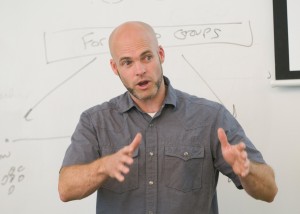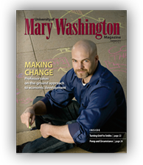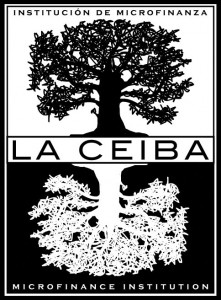
La Ceiba, the UMW student-run microfinance group, distributes loans and holds financial-literacy classes and meetings in the Villa Soleada school, built with funds raised by the UMW chapter of Students Helping Honduras. Photo provided by La Ceiba.
His first step was to go to Honduras. In January 2008, Humphrey joined an SHH trip. He saw how the people in poor villages there were living and how he might help. “I just remember walking through this community, and it’s blistering hot and there’s mosquitoes and it’s dusty and dirty,” he said. “And I’m wondering, ‘What the hell am I doing here? Get me back to my blackboard. Please.’ ”
But that trip changed him. He flew home and the next day walked into his developmental economics class. “I threw out the syllabus in front of them and said, ‘We’re going to make a microfinance institution.’ I basically committed myself to Honduras at that point,” Humphrey said.
That was the start of La Ceiba, a microfinance group run by UMW students. It began its lending in 2009, and every year since Humphrey has led a handful of UMW students to small Honduran villages to put the project into action. La Ceiba’s single goal is to help
its clients out of poverty by giving them loans to help support the start of a small business or to simply make it easier to pay the bills from one month to the next.
The seed money for La Ceiba came from the $2 a Day Challenge [see “Projects and Initiatives”] that Humphrey began in 2006. In 2008, its first year of fundraising for La Ceiba, it raised $6,750, which financed the first round of loans.
The La Ceiba project has had success. Since its start, UMW students have worked every year in three Honduran communities, and the project has hired a loan officer there. In all, the organization has made about 80 loans, the smallest being $25 and the average loan at about $130. As of late May, La Ceiba had about 45 active loans.
The numbers don’t reveal the hurdles Humphrey’s students have faced when they have tried to take classroom lessons into a real-world setting. For example, Tatiana Faramarzi ’12, then a UMW sophomore, headed to Honduras in December 2010 feeling prepared to teach village women the basics of how a loan works and how to create a small business. But once she got there, she learned she wasn’t ready.

Shawn Humphrey keeps an open mind about how to teach economics. Student questions about how lectures and theory help the poor led him to Honduras. On his return, he discarded the class syllabus and worked with students to create a microfinance group, which grew into La Ceiba. Photo by Terry Cosgrove.
Faramarzi, now 23, and about a dozen other UMW students had spent a semester working with Humphrey to prepare for their trip to Siete de Abril, a squatter community of a few hundred people in northern Honduras just outside the city of El Progreso. The families there are desperately poor. After Hurricane Mitch swept through Honduras in 1998, they rebuilt their village on a riverbank out of scrap materials.

